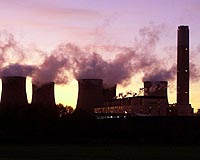 |
Gothenburg (AFP) Oct 2, 2009 A Europe-wide tax on personal or household fuel consumption was proposed on Friday as EU finance ministers met to discuss who should pay what in the fight against global warming. Detailed European Commission plans will be put before member states next year but an outline proposal was raised by the EU's taxation and customs union commissioner Laszlo Kovacs at the Gothenburg gathering. Revenues "should be used for climate change purposes (and) to finance the climate change efforts of the developing countries, because they need some support and we need revenues to support them," he said. The idea is being pushed against a backdrop of disquiet in some European Union member states about ambitious commission targets for bloc-wide aid to help developing countries ahead of deadlocked international talks in December. There was strong support for the 'Laszlo levy,' as one wag immediately dubbed it, from Swedish Finance Minister Anders Borg, who said a similar idea in the Nordic countries has worked well since the 1990s. Encouragement came from the French, where a levy on domestic fuel emissions will be introduced next year and where the government wants a separate 'frontier' carbon tax applied to imports from countries that fail to stump up for the fight against climate change. Belgium's Didier Reynders said the twin needs of boosting employment and battling climate change "may be a good opportunity to organise a shift in taxation from labour to other (areas)," citing CO2 emissions. However, an official with Britain's Chancellor Alistair Darling in Sweden said he knew of "one minister" who would not be offering backing for the plans any time soon, underlining firmly that "tax is a national issue." Kovacs admitted "unanimity" is required for any new EU tax proposals, but said "no sceptical countries have taken the floor" and pledged to seek "political agreement" in the first quarter of 2010. "What we want is to have a CO2 tax and certainly we will take into consideration all the experiences of member states that have introduced" such initiatives, mainly the Nordic countries, he said. Carbon emissions quotas already exist in Europe for industry, but only cover 40-45 percent of all greenhouse gas emissions, he said, adding that households, transport and other sectors could come under the new tax. The idea, like VAT or excise duty, would see the EU "fix a minimum" with member states "free to set it higher." Ministers discussed ideas, including emissions levels and national incomes, aimed at working out how to come up with funds aimed at convincing developing countries to sign up to a post-2012 global climate pact. The commission reckons five billion to seven billion euros will be needed each year between 2010 and 2012, with the annual figure likely to hit 100 billion euros (roughly 150 billion dollars) by 2020. Going into the talks, Polish Finance Minister Jan Rostowski said it was "totally unacceptable that the poor countries of Europe should help the rich countries of Europe to help the poor countries in the rest of the world." But Borg, who repeated frequent EU calls for the United States to step up to the plate, said "dark hours" were inevitable in negotiations and warned that the threat to half a billion Europeans was greater than any recession. "I am now more optimistic than I was a month and a half ago," added Economic and Monetary Affairs Commissioner Joaquin Almunia, who said talks on "burden sharing" had been "much more positive than our previous experiences." Share This Article With Planet Earth
Related Links
 US moves to limit industrial greenhouse gas emissions
US moves to limit industrial greenhouse gas emissionsWashington (AFP) Oct 1, 2009 The US government has taken a harder line on greenhouse gas emissions produced by factories, refineries and power plants by mandating energy efficient means for expansion, the Environmental Protection Agency said. EPA Administrator Lisa Jackson she would use the agency's existing regulatory power to clamp down on large polluters by requiring them to use the greenest technology possible if ... read more |
|
| The content herein, unless otherwise known to be public domain, are Copyright 1995-2009 - SpaceDaily. AFP and UPI Wire Stories are copyright Agence France-Presse and United Press International. ESA Portal Reports are copyright European Space Agency. All NASA sourced material is public domain. Additional copyrights may apply in whole or part to other bona fide parties. Advertising does not imply endorsement,agreement or approval of any opinions, statements or information provided by SpaceDaily on any Web page published or hosted by SpaceDaily. Privacy Statement |